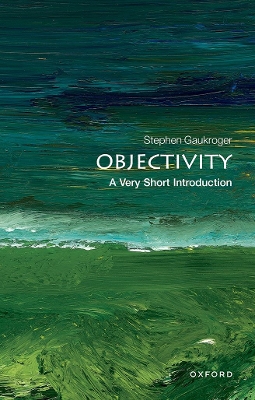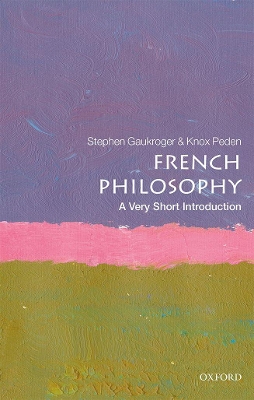Very Short Introductions
2 total works
- Is objectivity possible?
- Can there be objectivity in matters of morals, or tastes?
- What would a truly objective account of the world be like?
- Is everything subjective, or relative?
- Are moral judgments objective or culturally relative?
Objectivity is both an essential and elusive philosophical concept. An account is generally considered to be objective if it attempts to capture the nature of the object studied without judgement of a conscious entity or subject. Objectivity stands in contrast to subjectivity: an objective account is impartial, one which could ideally be accepted by any subject, because it does not draw on any assumptions, prejudices, or values of particular subjects. Stephen Gaukroger shows that it is far from
clear that we can resolve moral or aesthetic disputes in this way and it has often been argued that such an approach is not always appropriate for disciplines that deal with human, rather than natural, phenomena. Moreover, even in those cases where we seek to be objective, it may be difficult to
judge what a truly objective account would look like, and whether it is achievable.
This Very Short Introduction demonstrates that there are a number of common misunderstandings about what objectivity is, and explores the theoretical and practical problems of objectivity by assessing the basic questions raised by it. As well as considering the core philosophical issues, Gaukroger also deals with the way in which particular understandings of objectivity impinge on social research, science, and art.
ABOUT THE SERIES: The Very Short Introductions series from Oxford University Press contains hundreds of titles in almost every subject area. These pocket-sized books are the perfect way to get ahead in a new subject quickly. Our expert authors combine facts, analysis, perspective, new ideas, and enthusiasm to make interesting and challenging topics highly readable.
- Can there be objectivity in matters of morals, or tastes?
- What would a truly objective account of the world be like?
- Is everything subjective, or relative?
- Are moral judgments objective or culturally relative?
Objectivity is both an essential and elusive philosophical concept. An account is generally considered to be objective if it attempts to capture the nature of the object studied without judgement of a conscious entity or subject. Objectivity stands in contrast to subjectivity: an objective account is impartial, one which could ideally be accepted by any subject, because it does not draw on any assumptions, prejudices, or values of particular subjects. Stephen Gaukroger shows that it is far from
clear that we can resolve moral or aesthetic disputes in this way and it has often been argued that such an approach is not always appropriate for disciplines that deal with human, rather than natural, phenomena. Moreover, even in those cases where we seek to be objective, it may be difficult to
judge what a truly objective account would look like, and whether it is achievable.
This Very Short Introduction demonstrates that there are a number of common misunderstandings about what objectivity is, and explores the theoretical and practical problems of objectivity by assessing the basic questions raised by it. As well as considering the core philosophical issues, Gaukroger also deals with the way in which particular understandings of objectivity impinge on social research, science, and art.
ABOUT THE SERIES: The Very Short Introductions series from Oxford University Press contains hundreds of titles in almost every subject area. These pocket-sized books are the perfect way to get ahead in a new subject quickly. Our expert authors combine facts, analysis, perspective, new ideas, and enthusiasm to make interesting and challenging topics highly readable.
French Philosophy: A Very Short Introduction
by Stephen Gaukroger and Knox Peden
Published 23 July 2020
French culture is unique in that philosophy has played a significant role from the early-modern period onwards, intimately associated with political, religious, and literary debates, as well as with epistemological and scientific ones. While Latin was the language of learning there was a universal philosophical literature, but with the rise of vernacular literatures things changed and a distinctive national form of philosophy arose in France.
This Very Short Introduction covers French philosophy from its origins in the sixteenth century up to the present, analysing it within its social, political, and cultural context. Beginning with psychology and epistemology, Stephen Gaukroger and Knox Peden then move onto the emergence of radical philosophy in the eighteenth century, before considering post-revolutionary philosophy in the nineteenth century, philosophy in the world wars, the radical thought of the 1960s, and finally
French philosophy today. Throughout, they explore the dilemma sustained by the markedly national conception of French philosophy, and its history of speaking out on matters of universal concern.
ABOUT THE SERIES:
The Very Short Introductions series from Oxford University Press contains hundreds of titles in almost every subject area. These pocket-sized books are the perfect way to get ahead in a new subject quickly. Our expert authors combine facts, analysis, perspective, new ideas, and enthusiasm to make interesting and challenging topics highly readable.
This Very Short Introduction covers French philosophy from its origins in the sixteenth century up to the present, analysing it within its social, political, and cultural context. Beginning with psychology and epistemology, Stephen Gaukroger and Knox Peden then move onto the emergence of radical philosophy in the eighteenth century, before considering post-revolutionary philosophy in the nineteenth century, philosophy in the world wars, the radical thought of the 1960s, and finally
French philosophy today. Throughout, they explore the dilemma sustained by the markedly national conception of French philosophy, and its history of speaking out on matters of universal concern.
ABOUT THE SERIES:
The Very Short Introductions series from Oxford University Press contains hundreds of titles in almost every subject area. These pocket-sized books are the perfect way to get ahead in a new subject quickly. Our expert authors combine facts, analysis, perspective, new ideas, and enthusiasm to make interesting and challenging topics highly readable.

